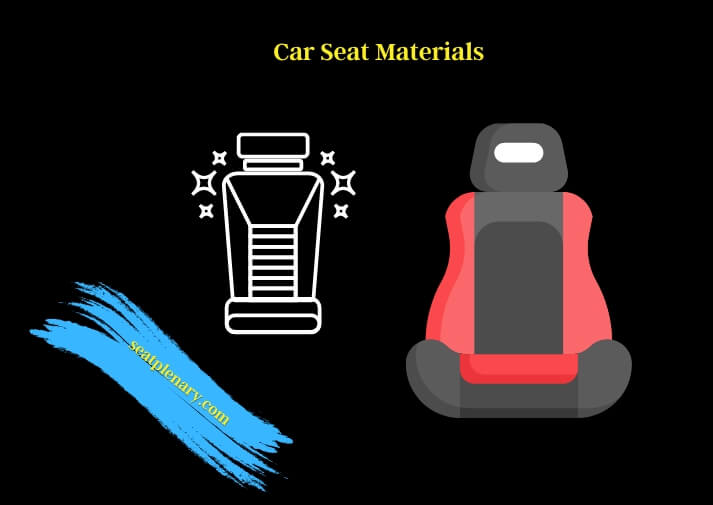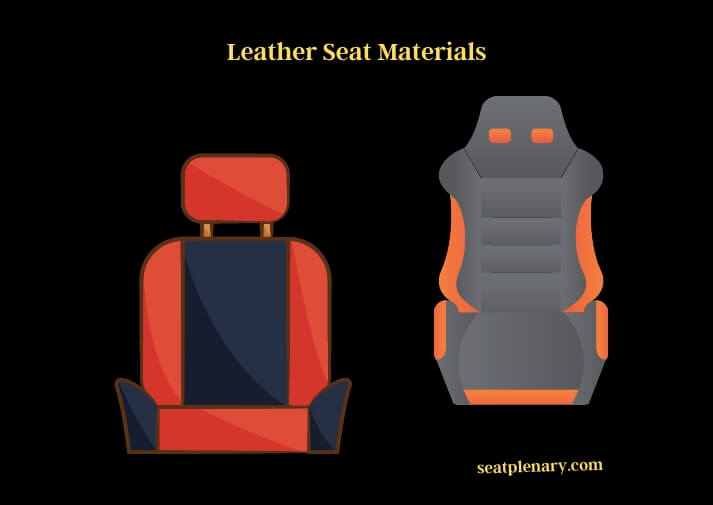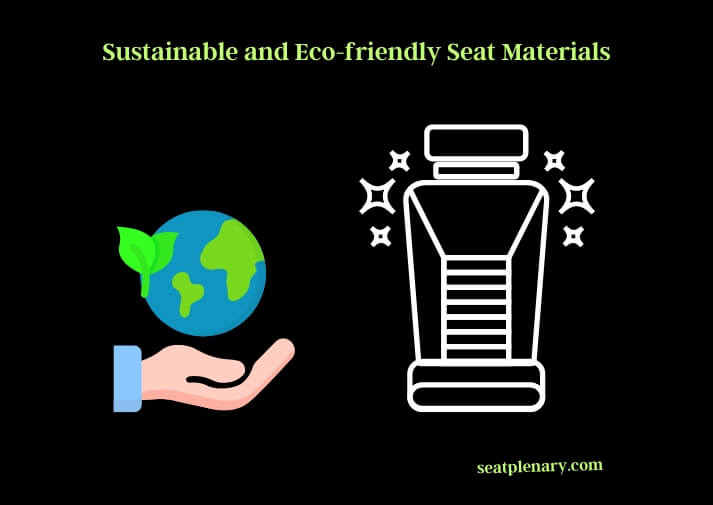Car seat materials shape the look, feel, and durability of automotive interiors. Each type brings a unique blend of aesthetics, comfort, and resilience to the user experience.
Polyester car seats, commonly found in modern vehicles, are prized for their durability and resistance to stains. The material’s toughness, combined with easy cleaning, makes it a favorite among car owners and manufacturers alike. For the curious, the process of cleaning polyester car seats usually involves mild soap, warm water, and a soft cloth, though different manufacturers may have specific recommendations.

The search for the best material for car seats often leads to a discussion of car seat fabric material choices. Nylon, for instance, is another contender, valued for its toughness and resistance to wear and tear. Despite its toughness, nylon still maintains a soft touch, ensuring comfort on long drives.
Historically, old car seat materials were not as diverse or refined as today’s options. These included cotton, vinyl, and early versions of polyester, which while durable, lacked the sophistication and comfort of contemporary materials.
Car seat material suppliers often provide a wide array of options, both synthetic and natural, to cater to varying customer preferences. Leather, for instance, is seen as a premium option and lends an air of luxury and sophistication to car interiors. The best type of leather for car seats is usually top-grain or full-grain leather. This high-quality material ages well, developing a unique patina over time, and offers an unparalleled level of comfort and elegance.
In the world of car seat materials, there’s truly an option for every preference, whether that’s the enduring strength of polyester and nylon, the classic appeal of leather, or the nostalgic charm of old car seat material choices.
Fabric Seat Materials
Cloth Seats
Types of cloth materials
Cloth seats are typically made from woven materials such as nylon, polyester, or a blend of fibers. These fabrics come in various patterns, textures, and colors, providing a wide range of customization options.
Pros and cons
Pros:
- Affordable
- Breathable
- Wide variety of colors and patterns
Cons:
- Less resistant to stains and spills
- Can wear and tear over time
Velour Seats
Characteristics of velour
Velour is a plush, knitted fabric that is similar to velvet. It is commonly used in luxury vehicles, offering a soft and comfortable feel.
Pros and cons
Pros:
- Luxurious feel
- Good insulation
- Available in multiple colors
Cons:
- Expensive
- Requires regular maintenance to retain its appearance
Alcantara Seats
Understanding Alcantara
Alcantara is a synthetic material that resembles suede. It is composed of a blend of polyester and polyurethane, offering a soft, luxurious feel.
Pros and cons
Pros:
- Lightweight
- Durable
- Resistant to stains, wear, and fading
Cons:
- Expensive
- May require professional cleaning
Leather Seat Materials
Genuine Leather
Types of genuine leather
Genuine leather seats can be made from various animal hides, such as cowhide, buffalo, or pigskin. The leather is typically dyed and treated to create a smooth, durable finish.

Pros and cons
Pros:
- Luxurious appearance
- Easy to clean
- Long-lasting
Cons:
- Expensive
- Can be hot or cold to the touch depending on the weather
Synthetic Leather (Faux Leather)
Types of synthetic leather
Synthetic leather, also known as faux leather or leatherette, is a man-made material designed to replicate the appearance and feel of genuine leather. It is often made from polyvinyl chloride (PVC) or polyurethane (PU) materials.
Pros and cons
Pros:
- More affordable than genuine leather
- Easy to clean
- Available in various colors and textures
Cons:
- Less breathable than genuine leather
- May crack or peel over time
Nappa Leather
Characteristics of Nappa leather
Nappa leather is a high-quality, full-grain leather known for its softness and durability. It is typically used in luxury vehicles and offers a supple, comfortable feel.
Pros and cons
Pros:
- Exceptionally soft and comfortable
- Durable and long-lasting
- Easy to clean
Cons:
- Expensive
- Requires regular maintenance to retain its appearance
Vinyl Seat Materials
Standard Vinyl
Properties of standard vinyl
Standard vinyl is a synthetic material made from polyvinyl chloride (PVC). It is a popular choice for commercial vehicles due to its durability and low cost.
Pros and cons
Pros:
- Affordable
- Easy to clean
- Water-resistant
Cons:
- Less comfortable than other materials
- Can become hot or cold depending on the weather
- Prone to cracking over time
Marine-Grade Vinyl
Special features of marine-grade vinyl
Marine-grade vinyl is a high-quality, heavy-duty vinyl material designed for outdoor use. It is UV-resistant, water-resistant, and mildew-resistant, making it suitable for convertible vehicles or those exposed to harsh weather conditions.
Pros and cons
Pros:
- Durable and weather-resistant
- Easy to clean
- Can withstand harsh conditions
Cons:
- More expensive than standard vinyl
- Less comfortable than other materials
Sustainable and Eco-friendly Seat Materials
Recycled Fabric Seats
Types of recycled fabrics
Recycled fabric seats are made from a variety of reclaimed materials, including PET plastic bottles, industrial waste, and post-consumer textiles. These materials are processed and woven into new, eco-friendly fabrics.

Pros and cons
Pros:
- Environmentally friendly
- Durable
- Unique and customizable
Cons:
- Limited availability
- May be more expensive than traditional materials
Plant-Based Leather Alternatives
Examples of plant-based leathers
Plant-based leather alternatives are made from natural materials such as pineapple fibers (Pinatex), apple peels (AppleSkin), or mushroom mycelium (MuSkin). These innovative materials offer a sustainable and eco-friendly alternative to traditional leather.
Pros and cons
Pros:
- Eco-friendly and sustainable
- Unique textures and appearances
- Cruelty-free
Cons:
- Limited availability
- Expensive
- May require special care and maintenance
Specialty Seat Materials
Carbon Fiber Seats
Benefits of carbon fiber
Carbon fiber seats are lightweight and strong, providing exceptional support and rigidity. They are typically found in high-performance vehicles and racing cars due to their weight-saving properties.
Pros and cons
Pros:
- Lightweight and strong
- Modern, high-tech appearance
- Can improve vehicle performance
Cons:
- Expensive
- Limited comfort compared to other materials
Heated and Cooled Seats
Technology behind heated and cooled seats
Heated and cooled seats use a combination of heating elements and air circulation systems to provide temperature control for the driver and passengers. These features can be found in a variety of seat materials, including leather, vinyl, and fabric.
Pros and cons
Pros:
- Enhanced comfort in extreme temperatures
- Can be used with various seat materials
Cons:
- Expensive to install or repair
- May increase energy consumption
Customizing Your Car Seats
Custom Seat Covers
Popular materials for seat covers
Custom seat covers are available in a wide range of materials, including neoprene, leather, suede, and fabric. They offer a cost-effective way to change the appearance of your car seats without the need for reupholstering.
Tips for choosing the right seat cover
- Consider the intended use and durability requirements
- Select a material that complements your vehicle’s interior
- Choose a color and pattern that reflects your personal style
Embroidery and Stitching Options
Adding a personal touch to your car seats
Embroidery and custom stitching can be used to personalize your car seats with monograms, logos, or unique designs. These features can be applied to a variety of seat materials, including leather and fabric.

Pros and cons
Pros:
- Adds a personal touch to your vehicle’s interior
- Can be applied to various seat materials
- Wide range of design options
Cons:
- Can be expensive
- May require professional installation
Proper Care and Maintenance
Cleaning Tips for Different Materials
- Cloth seats: Use a vacuum cleaner to remove debris, and spot clean stains with a gentle fabric cleaner.
- Leather seats: Wipe down with a damp cloth and use a leather conditioner to maintain the material’s suppleness.
- Vinyl seats: Clean with a mild soap and water mixture, then rinse and dry with a soft cloth.
- Alcantara seats: Vacuum regularly and spot clean with a damp cloth and mild soap solution.
Protecting Your Seats from Wear and Tear
- Use sunshades to minimize UV damage
- Avoid placing sharp objects on the seats
- Install seat covers to protect the original upholstery
When to Replace Your Car Seat Material
Consider replacing your car seat material when:
- The material shows significant signs of wear, such as cracks or tears
- The padding or support has become uncomfortable
- The material no longer matches your desired aesthetic
Summary
Choosing the right car seat material is essential for comfort, style, and durability. From traditional fabrics and leathers to eco-friendly alternatives, there is a wide range of options available to suit your preferences and needs. By understanding the characteristics, advantages, and disadvantages of each material, you can make an informed decision for your vehicle.
Frequently Asked Questions
What is the most durable car seat material?
Leather and Alcantara are generally considered the most durable car seat materials. However, the durability of any material depends on proper care and maintenance.
Can I change my car seat material?
Yes, you can change your car seat material by reupholstering the seats or using custom seat covers. Keep in mind that reupholstering can be expensive and may require professional installation.
What Are the Benefits of Using Vegan Car Seat Materials in Terms of Comfort, Style, and Durability?
When it comes to comfort, style, and durability, vegan car seat options offer numerous benefits. These eco-friendly materials provide exceptional comfort with their soft texture and hypoallergenic properties. Not only do they add a touch of sophistication to any vehicle’s interior, but they also come in a wide range of styles and colors to suit individual preferences. Moreover, vegan car seat materials are known for their durability, ensuring longevity without compromising on quality.
Are Leatherette Seats a Good Choice for My Car?
Leatherette seats explained: If you prioritize affordability and durability, leatherette seats can be a great choice for your car. These synthetic seats offer a similar look and feel to genuine leather, without the high price tag. With their resistance to stains, fading, and cracking, they are often praised for their low maintenance and easy cleanup. Additionally, leatherette seats are more animal-friendly, making them a popular alternative for those seeking a sustainable option.
What is the best car seat material for families with pets?
Vinyl and leather are the best car seat materials for families with pets, as they are easy to clean and resistant to scratches and punctures. However, if you prefer a fabric material, consider using a durable and washable seat cover to protect your upholstery.
How much does it cost to reupholster car seats?
The cost to reupholster car seats depends on the type of material you choose and the complexity of the project. On average, you can expect to pay between $200 and $1,000 per seat for professional reupholstery services.
Read more:
